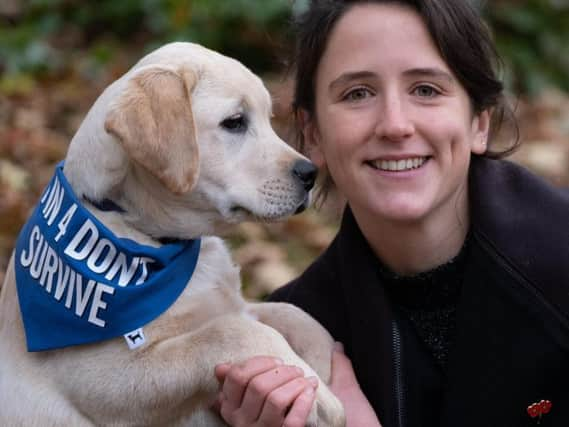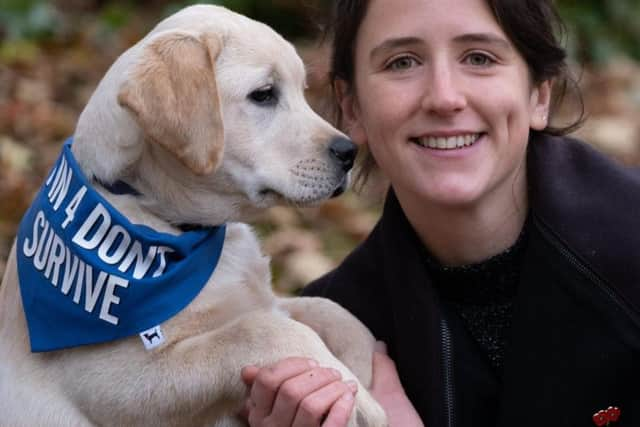Puppy farms in Scotland targeted in new regulations for breeders


A consultation on a new licensing system for breeders of domestic animals found 96.8 per cent of people supported increased regulation - including limiting the number of litters animals can have in their lifetimes and ending practices that lead to ill health and genetic disorders.
More than 650 responses were received by the government to its consultation document, with the vast majority in favour of new rules which would see a reduction in the number of breeders who put profit before animal welfare.
Advertisement
Hide AdAdvertisement
Hide AdNow the government will work with councils and animal welfare organisations to bring forward new regulations around dog, cat and rabbit breeding.


The move to tighten licence restrictions comes just four months after the Scottish Government launched a campaign to highlight the pitfalls of buying illegally bred puppies.
The puppy trade in Scotland is estimated at £13 million a year but a large proportion of these are illegally bred. Research has shown that a quarter of puppies bought online die before their fifth birthday, and one in three get sick or die in the first year.
Most illegally bred puppies are sold online through social media or small ad sites, with only 24 per cent of Scots buying from an approved breeder and one in four considering using an online advert or website to buy a puppy.
The new licence regulations would make it harder for illegal trade in dogs, cats and rabbits to continue as premises would have their annual number of breeding animals capped as well as restrictions put on how many litters animals could breed in their lifetime.
Of those respondents who agreed with a cap - suggested at 20 animals a year - the majority believed it could combat the rise of “puppy farms”.
A statement from the Dog Breeding Reform Group said: “A major problem in dog breeding is the existence of ‘puppy farms’. These are operations in which the over-riding concern of the breeder is the maximisation of profit, with minimal concern for the welfare of the dogs or puppies kept.
"A very important action that the Scottish Government can take is to specify a maximum number of breeding dogs that may be kept. This is more likely to ensure that only those with a commitment to the welfare of dogs operate.”
Advertisement
Hide AdAdvertisement
Hide AdHowever other respondents believed that 20 animals was still too many, and would be "unlikely to affect inadequate welfare standards at large scale breeding premises or the over-provision of specific breeds." There was also concern that six litters in a lifetime would be too many for some breeds of animals.
But the consultation also found that a reduction in animals being bred could also reduce the burden on animal welfare charities and rescue centres and increase demand for pets looking to be re-homed.
"As an animal rescue centre we are all too well aware just how long regulation has been necessary," said a submission from Mossburn Community Farm near Lockerbie. "Far too much thoughtless breeding takes place with the only interest of the breeders being money, resulting in literally thousands of unwanted, and often neglected animals, needing to be either euthanised or taken into care.”
Today, Rural Affairs and Natural Environment Minister Mairi Gougeon, said: “We love our pets in Scotland, so it is no surprise that so many people are in favour of our proposals to further protect the welfare of cats, dogs and rabbits.
"The aim is to modernise the whole licensing process - making it less onerous on those organisations already doing the right thing and, most importantly, ensuring that the system is centred around the welfare of animals.
“The Scottish Government will now work with local authorities, welfare organisations and individuals to bring these regulations forward.”
The plans received the backing of local authorities, although many raised concerns about the potential financial and logistical burden of a new licensing regime.
South Lanarkshire Council's response said: “Increasing the scope of licensing to other animals will have the consequence of increasing the workload during a period when the demands on Environmental Health Services are already high.
Advertisement
Hide AdAdvertisement
Hide Ad"In general, we support the idea of expanding the scope to include cat and rabbit breeding but would express concern that this will create demands beyond the licensing scheme itself; there will be tangential demands in responding to complaints, enquiries and freedom of information requests.”
There was also majority support for a proposal that individuals with unspent convictions for animal welfare offences or other criminal convictions should not be allowed to hold a licence for breeding activities with just 4.8 per cent against the idea.
Others believed that there should also be a ‘fit and proper person’ test for those running dog, cat or rabbit breeding activities, including having appropriate qualifications in animal care and animal husbandry, knowledge of the species and breed being bred, access to premises appropriate for the scale of breeding operation and the species involved and access to appropriate financial resources in case of necessary unplanned expense.
In a joint statement, the British Veterinary Association, British Small Animal Veterinary Association and British Veterinary Zoological Society, said: “We would welcome a requirement that those undertaking breeding activities should be required to demonstrate that they have the knowledge and resources to meet the health and welfare needs of the animals in their care, as well as the knowledge to provide suitable advice to prospective owners and the ability to assess behaviour such that animals are matched to new homes appropriately.”
Similarly 93.2 per cent of respondents were in favour of the proposal that the government should "discourage the breeding of dogs, cats and rabbits with a predisposition for specific genetic conditions, which lead to health problems in later life". Of those not in favour, there was concern that discouraging the breeding of animals with a predisposition to genetic conditions which may cause health problems could lead to a ban in-effect on the breeding of certain breeds.